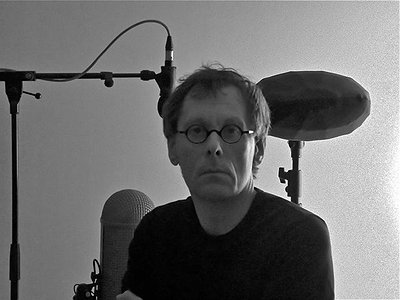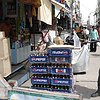When did you start writing/producing music - and what or who were your early passions and influences?
Directly related to my work today I’d say I am much influenced by Pierre Schaeffer and musique concète, the works of Francisco López and of course Chris Watson whom I’ve had the opportunity to meet several times, either on master classes and courses as well as on other occasions.
Some people have great creative minds and a gift and willingness to share. Chris is certainly one of them. I also feel influenced by John Cage, Morton Feldman and by Richard Chartier. All of them because of the interest in silence that I share with them. But I am equally influenced by having grown up in the country side just listening to dusk settling and night falling.
But I really started taking my work seriously only some 10 or so years ago. Call me a late comer but that’s how it is. If there is one thing I’ve learned it is to just do my thing, no matter how other worldly the idea or however long it takes to realise.
What do you personally consider to be the incisive moments in your artistic work and/or career?
Hard to say. So far it has been a more gradual thing rather than a process with corner stone moments. Last year, 2012, was important with a CD release and an installation at Bozar in Brussels and another exhibition. I tend to go with the flow and prefer organic evolution.
How would you describe and rate the music scene and sound potential of the city you are currently living in and how important is it for your own work?
I’d say very vibrant and diverse. On any given day you would have a multitude of venues to go to ranging from main stream to underground. Artists have a great environment for performance opportunities.
Perhaps more importantly there is also a good number of artist support initiatives. These range from training opportunities like learning how to use Pro Tools or Logic and production techniques to support on how to release a CD and how to find your way in copyright and even support on how to set up a business for your music, get funding etc. The National Federal Employment Agency distributes a guide for aspiring musicians.
So I’d say there is a lot of room for initiative and there is support to help you channel your creativity. And for an audience that is only so much the better.
But this is not New York or London. Permanent sound art galleries there are not, so there is still a lot to do.
What are currently your main compositional- and production-challenges?
Well, that would be multi-channel and sound spatialisation. I am more and more abandoning the idea that you can record directly to multi channel and have usable material. Having a double mid-side rig set up is useful for capturing atmospheres but from a compositional point of view, mono recordings are much more interesting. Multi channel needs to be created in the studio if it is to be convincing. Placing a mono sound in the sound space is much easier. Technically also less problematic as there is less to worry about with phase issues.
In a recent 4 channel, 20 minute piece sound piece I did for the Bozar Centre of Fine Arts here in Brussels, that was part of a photo exhibition, I also found that making a production stable to keep running for 3 consecutive months in a museum environment is not an easy thing. You have operators that start and shut down the installation, there could be a power brownout or outage, anything can go wrong. I set it up using Max/ MSP which is rock solid but I’ll need to rethink a few things to make it easy to operate.
Also I feel I have to let the recorded sound material rest for a while. So when I am back from a location I just file everything and maybe do some quick monitoring through some of the material, but it will generally just remain in the archives until I feel I can do something with it. So I don't have an idea and then go out to record, I just record what seems interesting and afterwards start the composition hoping to find what I need in the archives.
When I'm working on a piece, it is much more difficult to let things go than to put things in...
How do you see the relationship between sound and composition?
Creating a piece from material recorded on location means you work directly with the sound material. Sound is the building block of the composition.
What do you usually start with when working on a new piece?
It usually starts out with a rather vague idea of what I want to reach, more of a feel or an inspiration for a sound environment which I then try to capture in some sort of graphic score that both develops as I work on the piece and serves as reference, a map that tells me where I am. That score contains representations, drawings of sounds on a time line, sometimes with frequency and dynamics information. Next I turn to Logic where the piece then develops.
How do you see the relationship between location and sound and how do you select your locations or objects of interest?
First I should say that my main interest lies with environments that are quiet to near silent or with slowly evolving sound, drones. I want to know what an environment sounds like at its most quiet. That can be a city environment, abandoned places, nature reserves and so on. I carry a special interest for night time. Nightly soundscapes are infinitely more interesting than day time environments. A lot of my recording work happens at night.
I try to focus on the tiny, delicate, low volume sounds that are part of an environment. Sounds that go mostly unnoticed because they are overwhelmed by a high SPL. While at first such an environment may appear quite monotonous or ‘empty’ but when you focus on sub 50dB SPL sounds, you start realising there is a lot happing.
What will influence your decisions on how or how much to edit the material captured in the field?
I try to do as little editing as possible. I try to leave the material intact. But I do want a piece to have a certain feel. It has to bring the location to the listener or audience. To that end I will do whatever audio cleaning I deem necessary. This ranges from removing unwanted hiss. I want to stress the word ‘unwanted’ here, as opposed to removing disturbing sound elements. If I am in front of an industrial facility that has this great drone I do not want the dog barking through it, so I will take that out in editing.
Ultimately I want to recreate environments. Or maybe I should say, I want to create my interpretation and feeling of that environment. I may emphasise certain frequencies with slight EQ or dynamic EQ adjustments because I feel they support the atmosphere. And of course you cut down recordings to length. If I feel I need a part to go on for 15 minutes then that’s what I’ll do. At other times, fragments of just a few seconds may be layered in.
Without any prior information on field recordings, listeners may sometimes find it hard to determine their precise origin and context. Depending on one's perspective, this may be desirable or a problem. Where do you stand on this? Do you feel that, as part of your work, music needs to be explained or should it retain its “inexplicable nature”?
Yes, it is remarkable how many times I get asked what a particular sound is or where it was recorded and so on. Probably this is the result of the fact that I recreate live environments in my sound work as opposed to other artists who go in a much more abstract direction in their work; I don’t know.
So, I answer the questions but I do not feel that music or a sound piece needs to be explained. Or at least not upfront. If you have to write up a two page manual to accompany your work to make it understandable you better stop doing what you’re doing. The work should speak for itself and people are free to make it part of their own world.
To me the most interesting discussions come when I am able to talk to people who are on a totally different plane than the one I am on regarding a specific piece. If another person does not connect to this piece at all, then that is equally fine.



